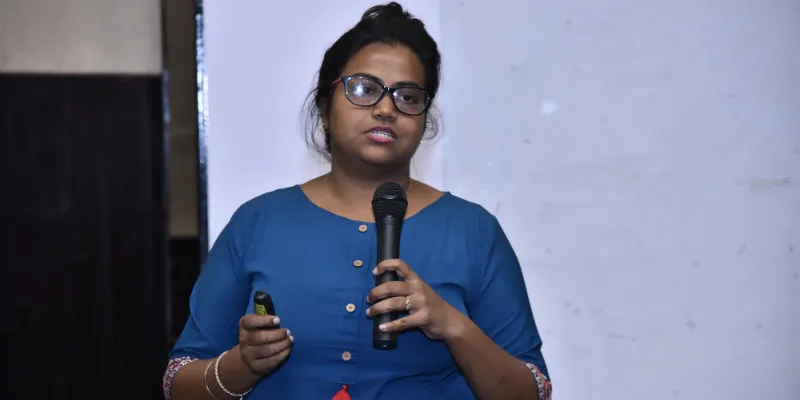Patna-based Swayambhu wants to make inroads into the clean energy sector
Founder Akansha believes that sustainability can go hand in hand with rural waste management, empowerment, and livelihood security.

It was interesting to see Akansha pitch for Swayambhu, her for-profit organisation that aims to generate bio-energy by linking a community to a community biogas plant (CBP), at WE Sprint Programme of Atal Innovation Centre of Banasthali Vidyapith in Jaipur.
The young and feisty entrepreneur fielded a number of questions from prospective investors on the viability of the project and the possibility of generating revenues in the short term.
Catching up with the young woman after the event, I unwittingly ask her for her full name. Just call me Akansha, she says, wanting to speak more about her story as a social entrepreneur from Bihar, and her intention of bringing change to rural communities through bio-energy.
After completing her schooling in Patna, Akansha moved to Banasthali Vidyapith in Rajasthan, where she completed her higher secondary education and also a Bachelor’s degree in Business Administration. The first seeds of entrepreneurship were sown there with Nav Utkarsh, where the girls had to come up a business plan with just Rs 300.
“I identified three things that were not available in Banasthali – pineapple slices, meetha paan, and nail art. We provided these, earned a lot of money and came second in the competition,” she recalls.
Entrepreneurship as a subject was intriguing at university but Akansha was not sure of the way forward. So, she enrolled at Tata Institute of Social Sciences (TISS) for a social entrepreneurship course. After completing it, she focused on handicrafts for a while. A visit to a tribal village in Madhya Pradesh changed her perceptions and brought a focus to what she really wanted to pursue in life.
“For three months, I had to live in Jhabua, a tribal village, and experience rural life. We had to bathe in ponds, defecate in open spaces, and sleep on the ground. Most nights, we would see the villagers wake up and irrigate the fields. We realised that this was the only time the power came on. I thought of focussing my thesis on the reasons behind the failure of biogas and biofuel in India and conducted research in Udaipur and Rajasthan,” she says.
Akansha started Swayambhu in 2015 as a for-profit organisation with an aim of generating bio-energy by linking communities to CBPs, which would use domestic/kitchen, livestock and farm waste on a mass scale to produce biogas, thereby generating electricity and other by-products like organic manure and bio-pesticides. The project works on a decentralised model and acts as a circular economy, where land is taken on lease for at least 20 years and waste (livestock and farm) is purchased on a daily basis from local farmers. This helps in extra livelihood generation, rural waste management empowerment, and livelihood security.
Swayambhu received a collaborative grant from Government of Singapore, which helped it kickstart the project.
The pilot, informs Akansha, was a failure but that did not deter Swayambhu from working on it. Currently, it runs the project in Sitamarhi and Pusa in Bihar, the latter, she believes, is an example of an ‘empowered’ village in every sense.
“Ritu Jaiswal, the mukhiya of Gram Panchayat Raj Singhwahini, Sonbarsha, has changed the face of the village by educating women about their rights. We need more women like her,” says Akansha.
She admits that it has not been an easy ride so far.
“I encounter two types of people when I travel and visit villages. There are men who say, ladki aayi hai gaon mein, humhe unki maddat karni chahiye (a girl has come to the village, we must help her) and the others who go, ladki aayi hai gaon mein (see this girl who has come to our village, in a sarcastic undertone). But it’s the former’s support that keeps me going.”
Also, in a lot of villages, decision-making was left to the men. So Akansha let her co-founder Ashutosh Kumar do the talking.
The ultimate outcome of project, she avers, is not just revenue generation. It’s also about social and financial empowerment. “We deposit the money directly into the woman’s account so that she has complete control of what she earns,” she says.
Swayambhu is looking to raise Rs 60 lakh in two trenches to cover the cost of six community biogas plants in the form of equity or grant. The aim is to cover at least 1,000 households through a cooking pipeline and produce around 180MT of bio-fertiliser every month.
“It’s disappointing that clean energy does not find many takers when it comes to investments. But I will plough on, nevertheless,” she concludes.







